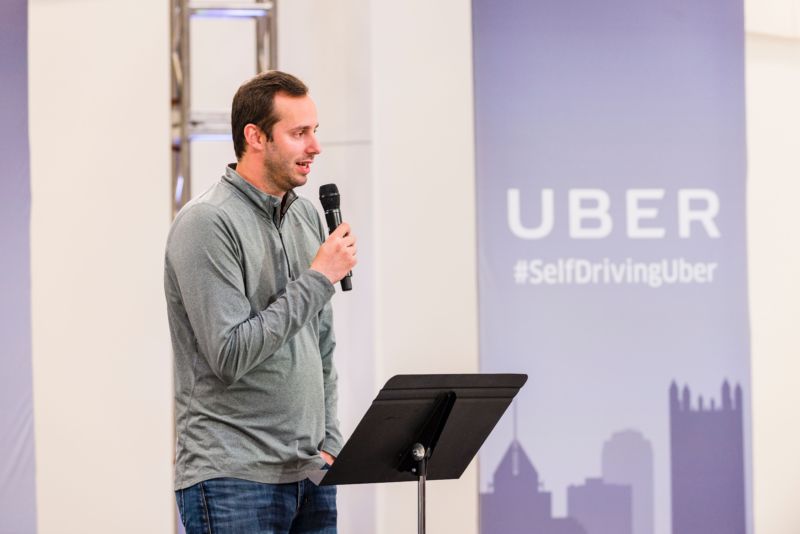
Alphabet’s huge legal battle with Uber over self-driving technology ended two years ago. But the engineer at the center of that fight, Anthony Levandowski, is still facing legal and financial headaches. On Monday, he told a federal bankruptcy court in California that Uber was contractually obligated to cover a $179 million legal judgment that Levandowski owes to Google. Levandowski asked the court to order Uber to enter arbitration on the matter.
Levandowski claims that Uber was fully aware of the circumstances of Levandowski’s 2016 departure from Google when Uber acquired Levandowski’s self-driving startup, Otto, later the same year. Prior to the acquisition, Uber hired a firm to look into the background of Otto and its founders. Levandwoski says he cooperated fully, giving investigators access to his email accounts and personal files.
According to Levandowski, the investigators found—and told Uber—that Levandowski had files belonging to Google on his devices and had tried to recruit a number of Google employees for his new company while he still worked for Google. Levandowski claims that he repeatedly warned Uber management, including CEO Travis Kalanick, that Google was likely to sue if Uber bought Otto. But according to Levandowski, Kalanick wasn’t concerned. “Uber eats injunctions for breakfast,” he allegedly told Levandowski.
Levandowski says Uber’s acquisition terms for Otto included a sweeping indemnification commitment for Otto employees, including Levandowski. Uber reportedly promised to defend him against a potential Google lawsuit even if he was accused of serious misconduct. Levandowski says Uber specifically promised to protect Levandowski if he was accused of misappropriation of trade secrets or breach of loyalty to a former employer—two of the key accusations Google later leveled against Levandowski. The indemnification clause said that Uber would pay any expenses arising out of a lawsuit from a former employer, including damages.
When Google began legal proceedings against Levandowski in October 2016, he invoked this indemnification clause. As a result, Uber’s lawyers handled his defense. But the relationship started to sour the next year, when Levandowski invoked the Fifth Amendment during Alphabet’s legal battle with Uber. Levandowski was justifiably worried that he could be criminally prosecuted.
Uber fired Levandowski shortly afterward, but Levandowski says Uber continued to cover his legal costs in his separate, personal legal battle with Google for another two years. Finally in late 2019, Uber told Levandowski that it was withdrawing from his defense and would not pay a recently decided $179 million judgment against him. Levandowski says Uber told him the indemnification deal was void because Levandowski hadn’t disclosed to Uber his role in creating a lidar startup called Tyto. Google argued that Levandowski had breached his duties to Google by secretly forming Tyto while working on similar technologies on Google’s payroll.
Levandowski disputes this. He says that details about his role in Tyto were contained in the files he turned over to Uber’s investigators prior to the Otto acquisition. And he notes that Uber certainly knew about the Tyto situation starting in October 2016, when Uber’s lawyers began defending him. Yet they represented Levandowski for three years under an indemnification clause the company now says is invalid.
Uber declined to comment for this story. A spokesman pointed to a regulatory filing merely stating that Uber’s liability in the case is disputed.
If Levandowski ultimately wins his case against Uber, it could save him from bankruptcy. Levandowski made $127 million working for Google in the decade before his 2016 departure. Google managed to claw back that money, and then some, in its case against Levandowski, forcing him to declare bankruptcy.
But if Levandowski can force Uber to pay Google that $179 million judgment, plus his legal bills, it would leave Levandowski with a net worth in the tens of millions of dollars. His bankruptcy filing last month showed him with at least $50 million in assets. His only substantial liabilities were the $179 million he owed Google and $3 million he owed to his law firm.
Levandowski recently pleaded guilty in a separate criminal case related to his theft of confidential information from Google. Under federal sentencing guidelines, he could be sentenced to more than two years in prison.
https://arstechnica.com/?p=1665025

